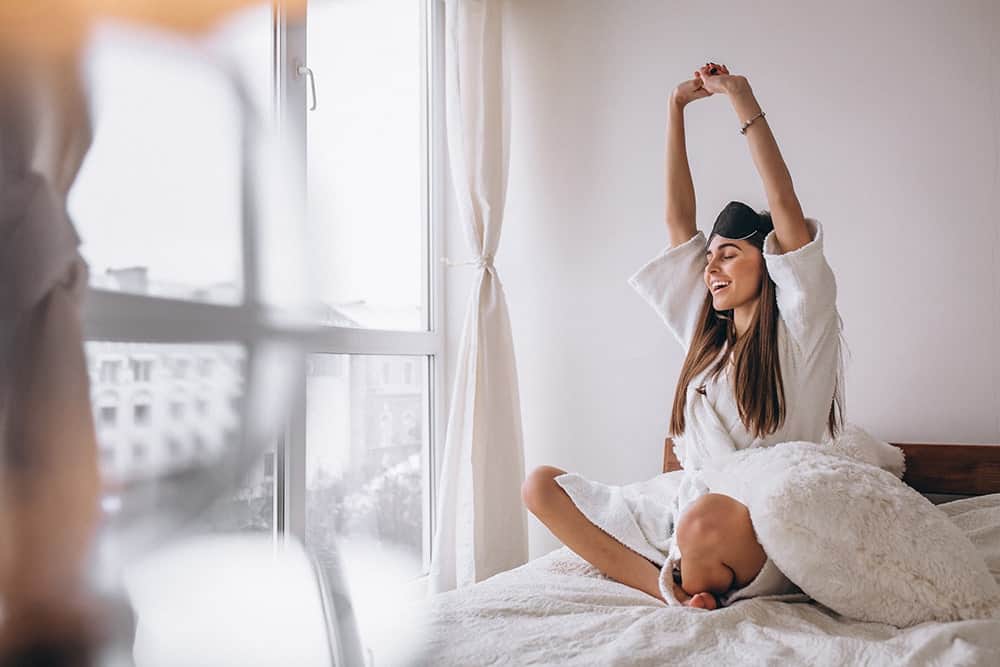Green tea has so many benefits when it comes to promoting a restful sleep. Green tea at bed time can be a great relaxant and best energy stimulator during the day.
Green tea is native to China and India where it has been consumed as a staple for centuries. Unlike 78% of the black teas consumed around the world, Green tea is brewed directly from dried leaves of Camellia sinensis. It is not fermented and purest of tea forms; a brilliant medicine and remedy to sustain your long-term immunity.
Due to its herbal nature and lack of oxidation, the green tea leaves retain a powerful combination of minerals, vitamins and other anti-inflammatory substances that can prevent cancers and cardiovascular diseases. There is ample evidence to support its countless benefits during the day and night, some of which will be talked about in this article.
Drinking Green Tea Before Bed Can Make You Sleepy
With our spoiled dietary habits and daily routines, it is difficult for many to achieve a sound sleep. A soothing cup of green tea at bedtime can solve that problem.
Having a cup of green tea with a hint of honey before going to bed is also great for metabolism and digestion after a heavy meal. A popular combination of green tea mixed with peppermint also doubles the relaxation effect on your brain and promotes a restful sleep.
Drinking Green tea has multiple benefits not just for your sleep but also your organs and other bodily functions.
Reduce Stress
One of the most important ingredients in green tea is L-theanine, an amino acid which reduces anxiety and calms your brain. This is because L-theanine has the ability to relax muscle tension and reduce blood pressure which brings that tranquil effect.
As one 2017 study suggests, when participants took 15mg/d of L-theanine in green tea for ten days, it showed a remarkable decrease in their stress. So if you drink green tea at night, remember it is one of the biggest sources of L-theanine and will help you a great deal in improving mental health by reducing stress hence inducing a healthy sleep.
Nerve Relaxation

While green tea efficiently makes you anxiety-free, it also has some stimulants for improving your nerve and cognitive performance without making you jittery. Green tea contains caffeine that blocks the adenosine receptors and activates neurons for a long period of time.
This phenomenon increases brain activity, improving concentration and memory. The combination of L-theanine and caffeine have a synergizing effect that improves the brain function and productivity.
Some studies have also shown that an antioxidant called catechins in green tea can prevent neurodegenerative diseases such as Parkinson disease and Alzheimers.
Boost Metabolism
Drinking green tea before bed helps with weight loss as your digestion becomes more efficient. One of the most important catechin present in green tea is the epigallocatechin gallate (EGCG) which boosts metabolism. It encourages high levels of hormones that direct the fat cells to burn fat quickly and leave it in your bloodstream to make energy.
According to a study conducted by American Journal of Clinical Nutrition, green tea extracts can boost your metabolism by 4% in a day. Taking about 4-5 cups of green tea is helpful in burning at least 70 calories per day, depending on the age, gender and body type.
Also, EGCG reduces the reproduction of inflammatory substances which cause hunger.
However, more research is still being conducted on a large scale. If you plan to lose weight in the long run, you must consult a dietitian before relying completely on green tea for your weight loss.
Combat Flu and Remove Toxins
Drinking green tea before bed can be great for your immunity. According to a Japanese research published in the Journal of Nutrition, green tea can fight against viruses. This is due to catechins’ ability to suppress the growth of a virus by binding to its cells. It is particularly tough on influenza and other flu-like diseases.
Also, green tea contains excellent antioxidants that sweep away the free radicals from your body. These are harmful substances produced by the toxin breakdowns that can affect your day to day bodily functions and make you vulnerable to diseases. By taking green tea at bedtime, your body will have enough antioxidants to keep it clean and help you sleep better.
Better, Longer Sleep
Drinking a cup of green tea at night, at least two hours before going to bed will help you sleep faster. Since green tea contains a very less amount of caffeine compared to black teas, you are less likely to have difficulty sleeping.
However, if you are sensitive to caffeine, opt for decaf green tea before bed. You can also buy older green tea leaves as those have less caffeine as compared to the new ones. If you can’t find older leaves or decaffeinated green tea, prepare your green tea in room temperature water as caffeine binds less to cold water.
Decaffeinated Green Tea Before Bed Helps Sleep Better

Decaffeinated green tea is a great substitute if you are avoiding caffeine altogether. This type of green tea when taken before bedtime can help you sleep better and longer. If you cannot find the product, you can simply remove caffeine by infusing a green tea bag by steeping and changing the water at least thrice.
Although the process in which decaffeinated tea is made does not fully remove the caffeine, it still works pretty well to help you get a good sleep at night. You can buy decaffeinated green tea in a different blend of herbs, flowers, fruits and spices for a soothing pleasure.
Does Green Tea Keep You Awake?
The tea that keeps you awake is mostly the caffeinated version which you should avoid taking right before going to bed. Green Tea’s caffeine content is significantly lower than other black teas and Oolong teas, however, taking it ten-minutes before going to sleep can leave you awake for some time. So make sure that you drink your cup of green tea at-least an hour before going to bed.
Does Green Tea Cause Insomnia?
Drinking green tea before bed can cause sleeplessness and even insomnia. Although Green tea’s caffeine content is about 2% to 4%, if you are consuming it excessively or drinking right before you sleep, there is a huge chance you might have trouble sleeping faster.
This is because caffeine stimulates our nervous system and makes us active. In another study it was found that when lactating mothers took green tea, it caused sleeplessness in the child.
Frequently Asked Questions
Why does tea make you sleepy?
If you are using a decaffeinated version of green tea at bed time, the L-theanine and other substances present in it can cause a state of calmness and sleepiness, which can lead to tea drunkenness if taken in great quantity.
Also sleepiness may happen if your green-tea is blended with some other relaxing ingredient. In the caffeinated versions of green tea, there is caffeine that doesn’t lead to sleep. However, Caffeine and L-theanine when taken together can produce Alpha waves in the brain which can take you in a meditative state.
Is it good to drink green tea before bed?
Drinking it right before bed might not be a good idea due to the presence of caffeine, and particularly if you are caffeine sensitive. You must keep at least a few hours difference, perhaps an hour or two before hitting the bed.
Can drinking tea make you feel tired?
Green tea’s overall effect is relaxing and stimulating but in some cases, it can lead to tiredness. For example, people with chronic fatigue syndrome can feel worn off after consuming green tea. Other than that, people who are sensitive to L-theanine compounds can feel more sleepy and tired.
Who should not drink green tea?
Green tea can cause stomach issues in people with peptic ulcers or acid reflux due to a substance present in its leaves called tannins. It can lead to stomach aches, feeling nauseous and cause constipation. Additionally, people with iron deficiencies should avoid taking green tea because it seems to absorb iron from food.
Also pregnant women should not consume more than 2 cups of green tea because caffeine is associated with miscarriages and overall negative effects during pregnancy. A lactating mother should also avoid it as it causes sleep deprivation in the child.
Does green tea stain teeth?
It can lead to staining of teeth if consumed excessively. This is due to the presence of tannins which gives the tea its yellowish color and can lead to grayish stains on your teeth in the long run. Also, If you are drinking green tea at night on a daily basis, you might skip brushing your teeth which can lead to long-term staining.
However green tea stains are much less stronger than the stains of black teas or wine. You can add a hint of milk in your green tea to avoid stains .
Does green tea have caffeine?
Green tea has milder caffeine compared to other caffeinated drinks. There can be as much as 30 mg to 50 mg of caffeine in per serving of 8-oz (230-ml) of green tea. The amount of caffeine also varies with the type of leaves used. The older leaves have much less caffeine compared to younger ones.
